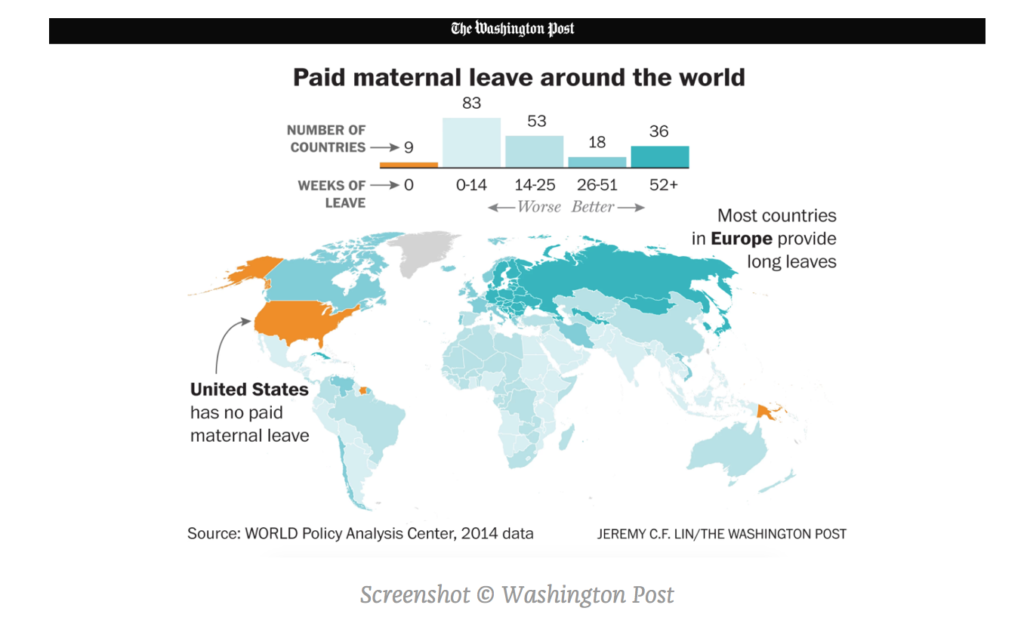“Mommy has to go to work.” A very simple sentence that often leaves a sense of guilt. Many mothers ask themselves how long they should stay home after giving birth. But opinions differ drastically when it comes to the ideal length of maternity leave.

It is impossible to predict your feelings after giving birth.
Before I became a mom, everything in my life remained very predictable. After successfully graduating from university, I pursued (with great determination!) my career as a Marketing and Product Manager. I always knew that I wanted to have kids. However, I also definitely planned to go back to work after my maternity leave came to an end.
And I have to admit, after being home for four months with my first child, I longed to get back to work — at least part-time. My back hurt from carrying my daughter around all day long. And I felt that I might literally go crazy speaking in baby language instead of sharing ideas and thoughts with my teammates.
But I also found that many of my friends tremendously changed their opinion about how quickly they wanted to get back into working life once they gave birth. Many women have a very clear idea on how they plan the time after giving birth. They plan how to handle childcare and organizing their lives. But then, suddenly, they find themselves in a completely new situation of life. Full of new emotions and suffering from sleep deprivation, they also experience a very strong bonding with their child. Even a control freak like me cannot predict what kind of feelings you will have at this point of time.
There remains a big difference in paid maternal leave around the world.
Only very few do not provide a maternity or parental leave. (These are mostly less-developed countries around the world such as Micronesia or Papua New Guinea.) But what really surprised me? The fact that the US ranks as the only industrialized nation to not guarantee women any paid maternity leave. Individual employers decide how much to offer (if any). The Washington Post says this: ‘The world is getting better at paid maternity leave. The U.S. is not.’

Back home in Switzerland? All employed women enjoy the right to take a 14 week maternity leave. During that time, their employer compensates them 80% of their present earned income. For another two weeks, special protective rights remain. The mother can stay home (unpaid) if she feels unready to go back to work. In comparison to the US, this might seem quite generous. However, if you look at other standards, you quickly see that even Switzerland lags far behind the front runners.
- Australia: Legally requires 12 months maternity leave.
- Germany: Mothers can take up to three years family leave.
- Sweden: Both parents allowed to stay off work until the child reaches 18 months of age.
When you compare the period of paid maternity leave in all the OECD countries, you see that Switzerland and the US bring up the rear — together with Mexico. There seems a definite demand for action from both our governments!
An ideal length does not exist. But it should definitely be more than nothing.
Many critics say that having a minimum paid leave is a burden for tax payers. They claim it slows down a nation’s economy. However, you might also argue that dropping birth rates threaten the global economy. The growing population of elderly people depends on a decreasing working population. A country actually needs a stable birth rate. Mothers take a considerable part in ensuring this rate. Therefore, they should not be discouraged by the fear that a pregnancy might be a career killer. Paid maternity leave should be associated with better job performance and retention among mothers, increased family incomes, and increased economic growth.
On a more emotional level (as this is a very emotional topic), I think that everyone who has already had a baby would agree that after only four weeks, the baby has hardly given a first smile. The mother has barely physically and mentally recovered from giving birth — particularly if they’ve had C-sections. It can take several weeks until the whole process of breastfeeding is working successfully. Not to forget all the different kinds of post-pregnancy feelings no one warns you about — sadness, fear, anger and doubts — just to name a few. Every mom has a different approach to dealing with those feelings. And every mom needs a different amount of time to cope with this new situation.
No matter whether you are looking forward to going back to work like me or you feel the urge to stay home for a little bit longer, this should be a choice each mother can make herself — a choice that might even change after her child has finally arrived.
In my eyes, there is no conflict of goals between paid maternity leave and a nation’s economical growth. Much more importantly, these two things go hand in hand.
















